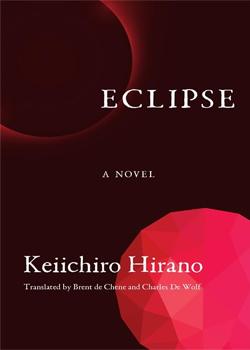Eclipse

By Hirano Keiichiro
Translated by Brent de Chene and Charles De Wolf
Columbia University Press (2024)
ISBN-13: 978-1782275909
Review by Laurence Green
On the cusp of the Renaissance, a young Dominican friar leaves Paris for Florence, chasing the wisdom of ancient, pre-Christian manuscripts. But his path takes an unexpected turn when he meets a mysterious alchemist in a remote village - an encounter that draws him into a perilous and morally perplexing search for enlightenment. As their fates entwine, catastrophe descends: weird disasters ravage the village, climaxing in a total solar eclipse that alters everything.
Hirano Keiichiro burst onto the literary scene in 1998 with Eclipse like a revelation. Written while he was still an undergraduate, it won the coveted Akutagawa Prize and stunned readers with its brilliance. Part historical odyssey, part philosophical meditation, Eclipse immerses readers in the mysticism of medieval Europe while asking probing questions that still haunt us today: the collapse of rigid worldviews, the struggle between light and darkness, the yearning for transcendence.
For English readers coming to Eclipse from one of Hirano’s other works in translation - A Man, or At the End of the Matinee - by warned, despite its slim length, Eclipse is another entity entirely. Whereas Hirano’s later novels have invariably targeted a sleek, cooly intellectual but resolutely mainstream seam (At the End of the Matinee was even turned into a blockbuster film), Eclipse is an exercise in pure, undiluted literary fiction - an Akutagawa winner in the very paragon of its potential form; the sheer love of language and its capacity to craft not just narrative and setting, but a singularity of feeling that is staggering at times, especially when we consider how young Hirano was when he wrote this short novel.
On the face of it, Eclipse’s historical setting and plot are simple - comparisons to Umberto Eco’s classic The Name of the Rose are apt - but if this was just a vaguely religious-themed, slow-paced tale of a journey from one place to another, there would be little to mark it out. What positively sings from every page of Eclipse though is the sense of assured style - a bizarre, and often unsettling quaintness in word choice and syntax that makes the novel feel like it was written hundreds of years ago. You don’t just read about a world of the late fifteenth century, you feel it - this sepia toned visage of rural backwaters that deftly manages to never descend into old-timey caricature. Instead, this world, for all its strangeness, is resolutely real - and all the scarier for it.
And that’s something we have to mention - this book is not for the faint hearted. From the very first page, wrapped up in the archaic language and postulations of antique philosophy and religious dogma, there is a sense of malaise to this world that builds and builds with palpable tension, tightening and tightening until we reach a dramatic reveal roughly midway through the book. In the tradition of great horror-thriller movies like Don’t Look Now, we feel something is deeply, deeply wrong with the village that forms the novel’s core setting, without ever being able to put our finger on precisely why. To say more would be to spoil a great denouement, but suffice to say, once revealed, we realise we are absolutely no longer in the world of the known any longer, and what follows only furthers the descent into a world that shocks and astounds us. The final climax is a masterpiece of dramatic tension, but also shirks nothing in terms of graphic visuality - the sensuality, violence and sheer explosiveness of Hirano’s prose here match any X-rated movie, and those on the queasy side are advised to tread carefully.
The translators, who have rendered Hirano’s text with masterful depth and verbosity - a task in itself given how many obscure references to medieval lore and alchemy there are - also contribute an insightful introduction to the book too. This raises a thorny question; whether to actually read it before the novel or not. The advantage in doing so is that it clarifies and contextualises a lot of Hirano’s creative decisions for phrasing the novel in the way he does - I was left wondering whether to have gone into its strangeness ‘cold’, so to speak, would have simply been too much. And yet, to read the intro does to some extent spoil what is to follow, and my feeling was that this accompaniment would have perhaps served better as an afterword. Whichever option the reader chooses, the analysis offered in this section is crucial in understanding the literary quality of the text, as well as simplifying to some degree what can at times be its more complex and obtuse qualities.
The introductory section makes note of how at the time of its release, Eclipse saw Hirano hailed as a kind of second coming of Mishima Yukio, and it is certainly true that in its astounding visual and sensual qualities, there is something of the same spirit there. There is a filmic ambience throughout that helps lend much needed power to the book’s slower sections, as well as punctuating its climaxes with an even stronger intensity of feeling. Eclipse is a novel that, in the best of sense, rewards the patient reader who may struggle through the early passages, where it is more unclear where things are going in terms of our young protagonist’s journey to the mysterious village - a point at which the pace finally begins to quicken. What is evidently clear though, by the time you reach the end, is that this is a work of the most profound literary texture - leaving mental images stamped in the reader’s mind that will last a lifetime. The aftertaste is bitter, unsavoury even at times - this is not a ‘pretty’ novel in any shape or form - but there is a dark beauty to it all the same.

